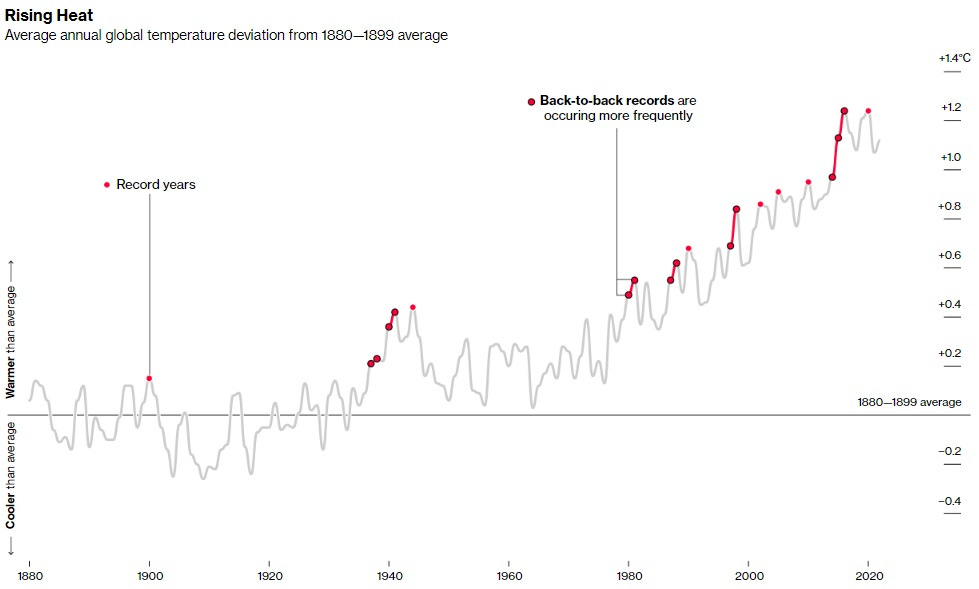⚛ Are we ready for another Atomic Age?
Also: 5 Quick Questions for policy analyst Shoshana Weissmann on occupational licensing and internet regulation
“Fusion will be ready when society needs it.” - Lev Artsimovich, Soviet physicist and fusion pioneer
The Essay
⚛ Are we ready for another Atomic Age?
Item: First came the hottest June in recorded history. Now it’s the hottest-ever July. This year is already highly likely to replace 2016 atop the heat ranking. Scientists suspect the last several years have been warmer than any point in more than 125,000 years. This acceleration of heat is the result of burning enough fossil fuel to raise global average temperatures about 1.2C since the Industrial Revolution. And we’re not yet halfway to Peak Heat. …The problem is clear: Existing weather is visibly outrunning our combined efforts to stem global warming. Humans are losing the race against heat. - Bloomberg, July 27, 2023
It’s possible to think that a) even the best climate models are wildly imprecise, b) environmental activists have wildly exaggerated the likely timeline and risk of climate change ... and yet c) doing nothing about our warming planet is a wildly reckless option. If you didn’t read my Q&A on Wednesday with Williams College economist Gregory Casey, I urge you to give it a look. He recently co-authored a paper on the economic impact of climate change for the San Francisco Fed. In our interview, he made a statement that also captures my view of how to think about climate change. Casey:
Personally, when I think about the impacts of climate change, I focus more on uncertainty. Climate scientists tell us that there could be large and unprecedented changes in natural systems if climate change continues on its current course. It isn’t clear how well these changes are captured in historical data. The potential impacts of these changes are hard to quantify, but it seems plausible that they will have sizable economic consequences. Wagner and Weitzman have a great book on this uncertainty called Climate Shock: The Economic Consequences of a Hotter Planet. They argue that a key benefit of climate policy is protection from these “tail risks,” and I find this argument convincing.
I also find that framework convincing. Humans don’t have an impressive record of grappling with risk in complex systems, ones full of interdependencies, feedback loops, and nonlinear responses. Given that, perhaps humility, caution, and consideration are warranted when thinking about climate change, even though it is a highly politicized issue. Doing nothing, I would argue, is a one-way, all-or-nothing bet with huge potential downside. In Antifragile, mathematician and contrarian Nassim Nicholas Taleb offers this great anecdote that has stuck with me over the years.
I was in Cyrpus at a conference dinner in which another speaker, a Cypriot professor of petrochemical engineering in a American university, was ranting against the climate activist Lord Nicholas Stern. Stern was part of the conference but absent from the dinner. The Cypriot was extremely animated. I had no idea what the issues were, but I saw the notion “absence of evidence” mixed with “evidence of absence” and pounced on him in defense of Stern, whom I had never met.
The petrochemical engineer was saying that we had no evidence that fossil fuels caused harm to the planet, turning his point semantically into something equivalent in decision making to the statement that we had evidence that fossil fuels did not harm. He made the mistake of saying that Stern was recommending useless insurance, causing me to jump to ask him if he had car, health, and other insurance for events that did not take plane, that sort of argument.
I started bringing up the idea that we are doing something new to the planet, that the burden of evidence is on those who disturb natural systems, that Mother Nature knows more than he will ever know, not the other way around. But it was like talking to a defense lawyer — sophistry, and absence of convergence to truth.
To be clear: My baseline case is that humanity doesn’t have a climate problem so much as it has a clean energy problem. While there is nothing inherently wrong about energy efficiency, the thrust of our global societal effort should be to generate abundant, affordable, pollution-free energy to power an ever-expanding and ever-richer civilization.
Good news on that front: We’re becoming ever more capable of becoming a cleaner high-energy planet. For example: The cost of solar has declined dramatically, and this year, for the first time, solar is set to attract more capital than oil production. (And there’s promising news on radically improving efficiency. The Shale Revolution is helping propel advances in geothermal energy, giving us more ability to tap the sun beneath our feet.
Then there’s nuclear, the subject of a massive new report from Citigroup, “Future of Nuclear Energy in a Low-Carbon Environment.” From that report:
Keep reading with a 7-day free trial
Subscribe to Faster, Please! to keep reading this post and get 7 days of free access to the full post archives.





